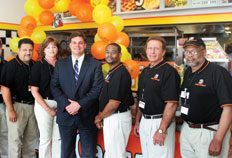David J. Thomas never planned on a career in franchising. When he left the military after a 12-year stint as an Army officer, Thomas went back to school to become a teacher. To help make ends meet, he began delivering meals on the side for an emerging concept called Steak-Out.
Before long, Thomas, who had overseen operations for a mess hall during a tour of duty in South Korea, was inquiring about opening his own Steak-Out restaurant, attracted by the promise of working within a proven system not unlike that of his former government employer.
“The military teaches you to do things the correct way, and when you get a franchise, they’ll tell you, ‘This is the way they do things here,’” says Thomas, who has been with the Norcross, Georgia–based chain for 19 years and now owns a restaurant in Columbus, Georgia.
“You can tweak it a bit based on the area of the country that you’re in, but you’re not going to rewrite the book,” he says.
Understanding how to work within an established system is one of many characteristics that make veterans attractive to fast-food franchisors. Others include leadership skills, character, and a sense of urgency, say companies that have brought former military personnel into their fold.
“What better person to run a franchised business than an individual who has just come through the rigorous training and discipline of the military,” says Ron Berger, CEO of Figaro’s Italian Pizza Inc., a Salem, Oregon, chain that has four veterans in its growing system of about 100 stores. “The first thing you do is follow orders explicitly.”
With new levels of U.S. troop engagement set for the war in Afghanistan as well as a commitment by the federal government to disengage, there are certain to be more veterans entering civilian ranks in the not-too-distant future. Meanwhile, high unemployment rates are pushing many of today’s returning service personnel to consider running their own businesses.
That’s one reason the International Franchise Association (ifa), a Washington, D.C.–based trade group, is stepping up its efforts to get the word out about the benefits of recruiting veterans into franchised businesses.
“It’s clear to us they are a group that’s been trained to follow systems,” says Dina Dwyer-Owens, the IFA’s chairwoman and CEO of the Dwyer Group, which operates repair-service franchises such as Mr. Rooter and Mr. Appliance. “Most of them have very strong values.”
In 2002, the IFA relaunched the Veterans Transition Franchise Initiative (VetFran), a program started during the Gulf War by Dwyer-Owens’ late father and Dwyer Group founder Don Dwyer Sr. VetFran members encourage franchise ownership to honorable-discharged veterans by offering financial incentives such as discounts in franchise fees.
Of late, Dwyer-Owens says she has seen renewed interest on the part of both franchisors and veterans. Since the relaunch, VetFran has brought at least 1,500 veterans into franchising. Among nearly 400 participating franchisors, there is a heavy restaurant emphasis with about 70 brands, including quick serves such as Manhattan Bagel, Figaro’s, Red Mango, Rita’s Italian Ice, The Coffee Beanery, and Tropical Smoothie Café.
Next year the program will move under the umbrella of the IFA Educational Foundation, where it will benefit from additional promotional dollars for the growing veteran interest in franchises.
“We’ll have an opportunity to do more proactive work because the foundation can fund it,” Dwyer-Owens says. “Organizations that we work with … are really trying to push this out, to make sure [veterans] know this is available.”
Even so, financing, especially in the wake of the liquidity crisis, remains one of the toughest hurdles. To ease the burden of veterans’ initial franchising costs, the IFA and many of its members have been pushing a bill known as the Help Veterans Own Franchises Act.
Introduced in June by Reps. Aaron Schock (R-Illinois) and Leonard Boswell (D-Iowa), HR 2672 would incentivize franchisors to offer discounted franchise fees to veterans through a tax credit worth 50 percent of the fee discount as well as a tax credit to the franchisee equal to 25 percent of the remaining fee.
At press time, the bill had 22 co-sponsors and was referred to the House Ways and Means Committee; Dwyer-Owens is hopeful for action sometime this year. Her group is also pushing to extend coverage of educational dollars under the GI Bill beyond undergraduate, graduate, and vocational training to franchise-training programs.
Despite these efforts, the stagnant lending environment will likely do much to shrink the large ranks of interested veterans down to a fairly limited pool of qualified applicants. Pizza chain Little Caesars is among few franchisors offering their own financing to qualified veterans; candidates often rely on savings, funding from friends and family, and small-business loans such as those available under the Small Business Administration’s Patriot Express program.
“They need to be able to fund the business and get a loan,” says Grant Benson, vice president of franchise sales for Dunkin’ Brands, a member of the VetFran program that has brought about 20 veterans into the franchise system since 2002.
The Canton, Massachusetts, company, which offers veterans a 20 percent discount off its standard $40,000 franchising fee, requires all franchise applicants to have at least $250,000 in liquidity and a net worth of $500,000. In the past year, Benson says, Dunkin’ Brands tried to ease franchising requirements by allowing for smaller initial deals of one to three stores.
Restaurant franchisors, especially those at established brands, say that ideal veteran candidates are those who bring proven restaurant operations experience along with their military background.
“That’s been our challenge, finding a veteran that has multiunit experience,” says Greg Vojnovic, vice president of development for the Atlanta-based Popeyes chain. In the coming year, Vojnovic says the company plans to shift its recruiting focus to reservists, who are more likely to bring the best of both worlds.
That may already be happening, the result of sustained levels of high unemployment across the country and fewer opportunities for jobs with corporations hamstrung by tight budgets and continued limitations on hiring.
Drew Meyers, president and CEO of RecruitMilitary, a private online matching service that connects employers, franchisors, and schools with veterans, has tracked increased interest by veterans in owning their own businesses.
“Twenty-four percent of the people who register with us click that they have an interest in franchising and entrepreneurship, which is a really big number,” Meyers says. “I think it’s up. During times like this, people want control.”
According to Meyers, what is needed now is increased education and better links between the private sector and veterans groups so that qualified candidates understand that alternatives to traditional employment exist.
“They just don’t understand there’s a world of opportunity out there, and that’s where the individual franchisors have a pretty big opportunity,” he says.












